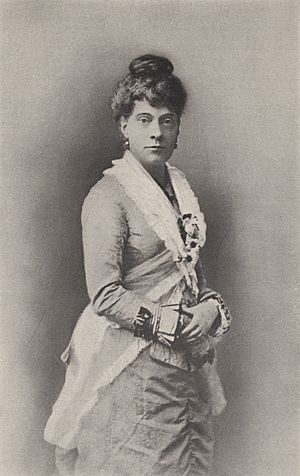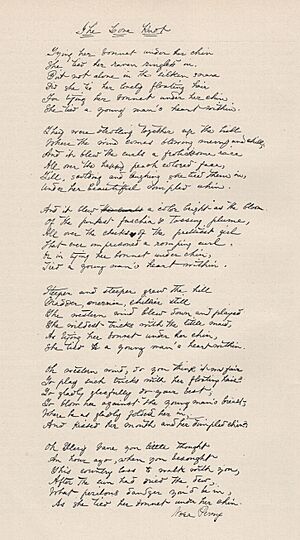Nora Perry (writer) facts for kids
Quick facts for kids
Nora Perry
|
|
|---|---|
 |
|
| Born | 1831 Dudley, Massachusetts, U.S. |
| Died | May 13, 1896 Dudley |
| Resting place | Swan Point Cemetery, Providence, Rhode Island, U.S. |
| Occupation | author |
| Language | English |
| Nationality | American |
| Notable works | "After the Ball" |
| Signature | |
 |
|
Nora Perry (born 1831 – died May 13, 1896) was an American writer. She was known for her poems, newspaper articles, and stories for young people. For many years, she wrote for the Chicago Tribune from Boston. Her famous poems include "After the Ball." She also wrote many books, especially stories for girls.
Contents
Nora Perry's Early Life
Nora Perry was born in Dudley, Massachusetts, in 1831. When she was a child, her family moved to Providence, Rhode Island. Her father worked in business there. Nora learned at home and in private schools. She received a good and varied education. Nora wrote her first piece, "The Shipwreck," when she was only eight years old.
Nora Perry's Writing Career
Nora Perry started writing for newspapers when she was eighteen. Her first long story, "Rosalind Newcomb," was published in Harper's Magazine in 1859-1860. Later, she spent a lot of time in Boston. There, she wrote about society events for the Chicago Tribune. She also became a correspondent for the Providence Journal, a very important newspaper in Rhode Island.
In 1859, a moving poem called "After the Ball" appeared in many newspapers. It was printed and copied everywhere. From that moment on, Nora Perry became a well-known name to readers. "After the Ball" and "Tying Her Bonnet under Her Chin" were her most popular poems from the 1850s. By the mid-1860s, she started focusing on writing stories for girls.
"After the Ball" was sometimes called "Madge and Maud." It was later included in a book with other poems in 1874. Even after she wrote many more verses, readers always remembered the image of the two girls in the poem:
"Sat and combed their beautiful hair
After the revel was done."
Nora Perry often collected her magazine stories and published them as books. These books were often called "summer reading." In 1880, she published The Tragedy of the Unexpected and Other Stories. This book was not a tragedy, but a pleasant summer story. In 1881, she released A Book of Love Stories. Young readers loved this book because it was new and easy to read.
In 1885, she published a short novel called For a Woman. In 1886, she released a book of poems, New Songs and Ballads. In 1887, she published A Flock of Girls. New Songs and Ballads had several poems that were very good, but none were as loved as "After the Ball." Some of the best poems in that book were "Her Lover's Friend," "Lady Wentworth," and "The Maid of Honor."
Her poems were collected in books like After the Ball (1875), Her Lover's Friend (1879), New Songs and Ballads (1886), and Legends and Lyrics (1890). Her stories, mostly for young people, include The Tragedy of the Unexpected (1880), For a Woman (1885), A Book of Love Stories (1881), A Flock of Girls and their Friends (1887), The New Year's Call (1903), Youngest Miss Lorton, and Other Stories (1889), and Brave Girls (1889). Her stories were lively and, like her poems, were popular with many readers.
Nora Perry's Personal Life
Nora Perry was a friend of another writer, Sarah Helen Whitman. Nora Perry passed away in Dudley on May 13, 1896.
Nora Perry's Writing Style
Nora Perry's writing was always proper and suitable for everyone. She did not try to teach obvious lessons in her stories. However, her work still showed good values and was carefully written. For example, her poem praising Vasco Núñez de Balboa, the first European to see the Pacific Ocean from Panama, shows her poetic style. Her stories were "briskly told," meaning they were lively. Like her poems, they appealed to a wide range of readers.
Selected Works by Nora Perry
- For a woman: A novel ...
- A book of love stories
- Lady Wentworth, 1857
- Letter to Mrs. Sargent. Providence, RI. 1876 Mar. 22.
- Bessie's trials at boarding-school, 1876
- Dolly's kettledrum, 1883
- The children's cherry feast, 1886
- For a woman, 1886
- A school-girl's pleasure-book, 1888
- The youngest Miss Lorton : and other stories, 1888
- Another flock of girls, 1890
- A rosebud garden of girls, 1892
- After the ball; Her lover's friend, 1896
- Three little daughters of the revolution, 1898
- La belle-mère de May-Bartlett, 1898
- Cottage neighbors, 1899
- That little Smith girl, 1899
- May Bartlett's stepmother, 1900
- Ju Ju's Christmas party, 1901
- Margy's two troubles; and other stories, 1907
 | Toni Morrison |
 | Barack Obama |
 | Martin Luther King Jr. |
 | Ralph Bunche |


